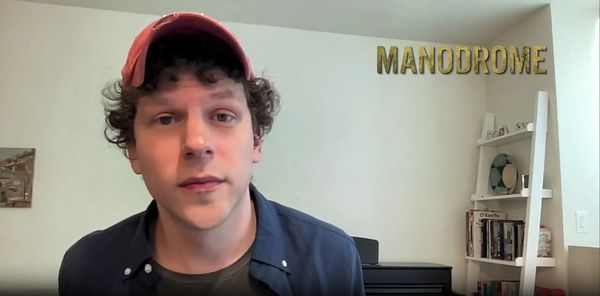 |
| Jesse Eisenberg discusses Manodrome |
Intently focused on the interior journey of a troubled character, Manodrome, which is currently in cinemas in the US, is an actor’s dream. I interviewed director John Trengove two weeks ago but subsequently got the chance to follow that up by talking to star Jesse Eisenberg, free to discuss his work after the end of the actors’ strike, and always, he tells me, happy to do publicity because “everybody’s so nice.”
In the film, Jesse plays Ralphie, a man who has recently lost his job, is in a rocky relationship with his girlfriend and is about to become a father, who makes a frantic effort to reclaim his masculinity by joining a cult. It’s not so long since he explored similar themes in Riley Stearns’ The Art Of Self-Defense, and many actors hesitate to take on similar material like that for fear of being typecast, so what made Manodrome appeal to him?
“It's funny you should say that,” he responds. “If you were to kind of just give a very general description of this movie and The Art Of Self-Defense, it would look like A to B to C, the exact same movie, and yet they're so vastly different. The Art Of Self-Defense is pitched as an absurdist comedy, a black comedy, and this movie is pitched as kind of a gritty drama. And it's so thrilling to be able to do that because your acting style changes quite a bit, but your emotions stay the same. But in a movie like The Art Of Self-Defense, you're feeling all of the same feelings. He feels emasculated, he feels timid, but it's being filtered through a funny bone, where you're aware of the comic timing and the comic set piece around it.
 |
| Jesse Eisenberg |
“And then in this movie, again, it's all those same feelings. You're feeling inadequate, emasculated, questioning your sexuality, questioning your own childhood trauma. And yet it's manifesting in this incredibly gritty way. And as an actor, you're trying to navigate those tones. To me, that's the most fun thing in the world, because it means that I get to use my emotional experiences and the thing I'm trained to do, which is, like, kind of mine my own emotional life for a creative purpose in two vastly different ways.”
This one seems the more challenging role, know, playing such a withdrawn character. How did he approach communicating with the audience as somebody who really struggles to communicate even with himself? He thanks me for the question and says that that’s exactly how he thought about it.
“How do you show emotions with a character that doesn't express himself, doesn't even know who he is? This is the challenge. And luckily, the movie, I thought, was built on such stable grounding. It read to me kind of like somebody had transcribed their own nightmare. And so even in the script there felt like there was this emotional reality to it, even when the logic was jumping around. And so I felt like I understood this character's emotions so well. I understood his feelings of inadequacy so well. And if the director can use what I'm doing to convey something to an audience, then my job is done.
“I don't have to overdo it. Sometimes it's hard to play smaller roles in movies because you only have a brief amount of time and space to convey who your character is and what you're feeling and thinking. But in a movie like this, which is so focused on trying to figure out what's happening in this strange, enigmatic man's mind, you can just experience the feelings in a real way, and then the movie should hopefully do the rest.”
What attracted him to working with John Trengove? Had he seen his work before?
“I hadn't seen it beforehand,” he says, referring to The Wound, “but wasn't surprised at how good it was when I finally did watch his previous work. He's a very special, creative person because he really digs into his own life experience and his own really quite personal, uncomfortable feelings, and then puts them out in the open. It's quite an admirable thing to do in the arts. And so with this movie, he was writing about all of these unbelievably private feelings in a way that is really quite unflattering to my character. A dark, dangerous person who is acting not only out of inadequacy, but acting with a rage and a violence. And so when I read the script, I thought, ‘My goodness, this is just remarkable that somebody was able to transcribe their own nightmare.’
“It's hard to write a movie that feels like a fever dream because most movies are written during the daytime when you're filtering everything through logic and what an audience might like. And that's just not what this was. This was a movie that was clearly written on scraps of notebook paper and on airplanes. And it was actually, because it was coming from an emotional place, not a literal place, so that was really special. And then as a director, he's just this kind of like, again, an unusually compassionate person. He's constantly trying to get at an emotional truth, rather than just trying to tell a story from A to B.”
I tell him that I really liked the work that his co-star, Odessa Young, contributed to the film. How did they develop their complex chemistry, the sense of a history and love which has now faded?
 |
| Jesse Eisenberg |
“She's a remarkable actress, which is the main thing. She's just really superb. She has just a wonderfully strong backbone as an actor, so even when her character is being humiliated by me or tormented by me, I would say she feels like an equally strong adversary, which is great for the movie, because you don't have a sense that this guy, me, is just actually terrorising weak people. He's actually terrorising people he loves and who are strong and who could fight back, which is even more tragic, in a way, because they're life partners.
“We really did not have a lot of time because she came in, goodness, a few days before shooting, and she was only cast a few weeks before shooting because of how the movie was progressing with production and scheduling and technical stuff. So boy, was I elated when we sat down in our first scene together in the car after I pick her up from work. I remember just thinking ‘Oh my goodness, thank God she's in this,’ because our scenes were a bit unknowable to me in the script. Like, what is he feeling for this woman? Who is this woman? Why were they initially attracted to each other if my character is so deeply rageful and unstable?’
“Sitting there with her, it all made sense. She's somebody who's strong but has a traumatic past too, so we would have connected in some ways, at the beginning, through feelings of inadequacy and trauma. But she's worked past that in a more healthy way than I have.”
His fans are likely to be surprised by the way he looks in this film – heavily muscled as he has never been before. He doesn’t look that way now, so I ask if it was just for the film.
“I basically just worked out for this character,” he says. “But the problem was the movie kept being pushed back, so I would basically have to stay at the gym, kind of in a holding pattern. And in terms of how it affected the part, I mean, you're going through this experience of the monotony of working out, but also surrounded by guys who it seems to come much easier to.
“I'm in the middle of Chelsea in New York City, and the strongest men in the world live in Chelsea. And so you're having these feelings of, like, I'm working out and I feel more centred in my own body and my own masculinity, and yet I'm surrounded by physiques that I will never achieve. So you have this feeling of empowerment mixed with inadequacy, and that's what the character is. He's both feeling inadequate and now, occasionally, empowered.”





















